While wandering the streets of Mostar, Bosnia, two aspects became immediately obvious to us – one good, and one terribly sad.
First, the city government realized the tremendous boon of tourism, and wisely, is restoring Mostar’s historic area. And sadly, the second fact is that Mostar was physically and emotionally devastated by a war less than 20 years ago; the city and its people are still recovering.
The historic Old Town lies on the shore of the beautiful, emerald-green Neretva River, and surrounds the Old Bridge (called “Stari Most” here – destroyed in the war, and since reconstructed). This is the primary tourist area and has been painstakingly rebuilt.
It’s a fairy-tale, medieval village with winding, cobblestone streets lined with charming cafes, riverfront restaurants, and local craft shops. Since it’s a haven for tourists, the money spent here has helped the city get back on its feet.
Parallel to this riverfront, and only one block away, is the village main street with two narrow lanes lined with businesses for the non-tourist crowd. Every block on this street has at least one building that is bomb-gutted and bullet-scarred. There are so many derelict buildings to deal with that the city can’t afford to restore or raze them.
Apparently, one of the problems is that many of these buildings had mortgages with Yugoslavian Banks, which disappeared along with Yugoslavia. As a result, no one really knows who owns the buildings, and no investor will touch them without some guarantee of ownership. So year after year they sit as a painful reminder of the terrible consequences of war.
Also, on this street is a compact, tree-lined park that once had a fountain and benches for relaxation. Now it’s jammed with white tombstones and the graves of the hundreds of people who were killed in the conflict.
The conversion from park to cemetery was necessary because snipers would indiscriminately kill anyone foolish enough to venture out during the daylight, and the trees in the park on a dark night provided cover to bury fallen loved ones.
Sadly, Mostar is like a coin with two faces, and you can’t experience one side without the other. But, we travel to learn, and many things that have happened in the world are not happy. We will always be glad that we came to Eastern Europe, and Mostar in particular, to see what the Bosnian War did to the people and their cities. The harsh reality of Mostar, like many other places, is that people recover from war, but the healing is painful and takes decades.
Peace and Tolerance,
James and Terri
Last Updated September 7, 2023
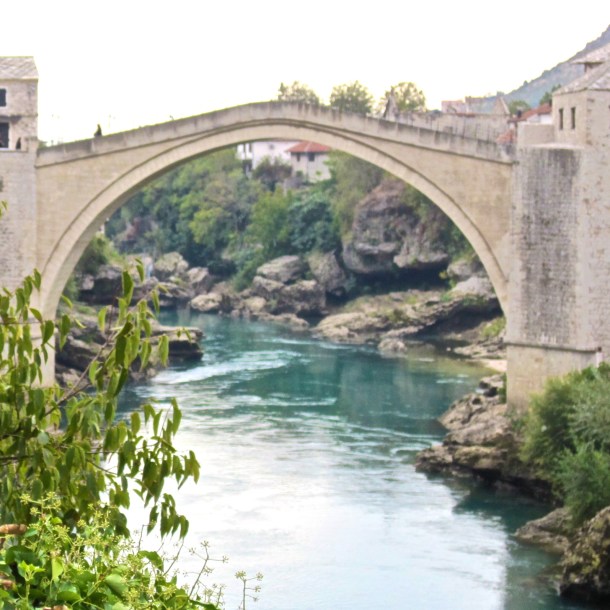
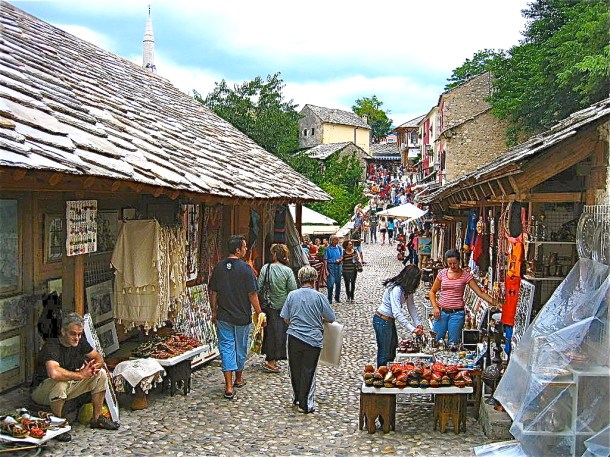
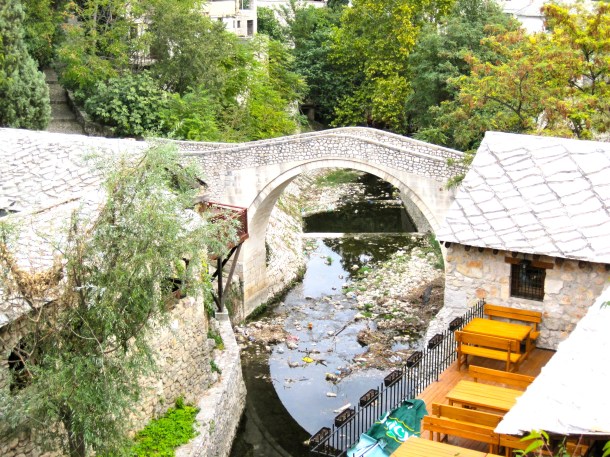
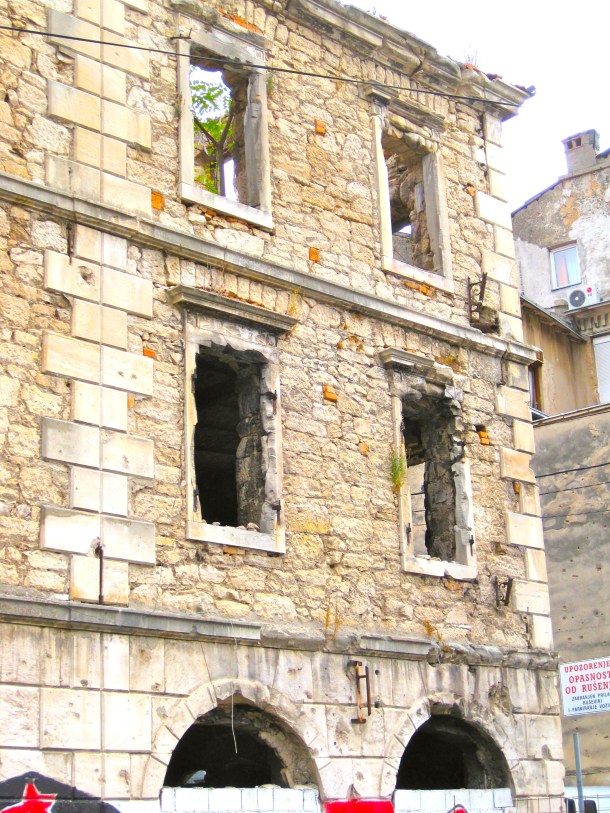
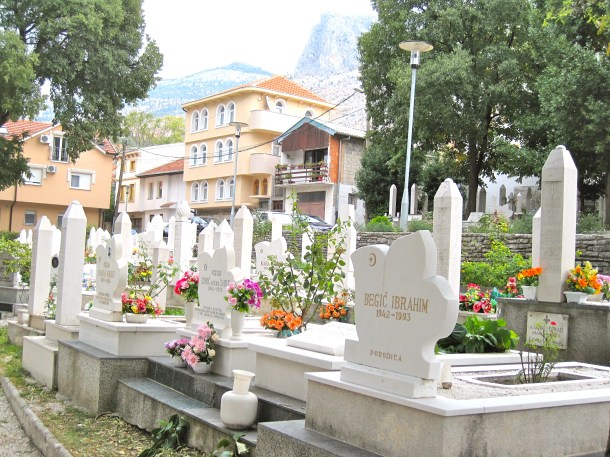
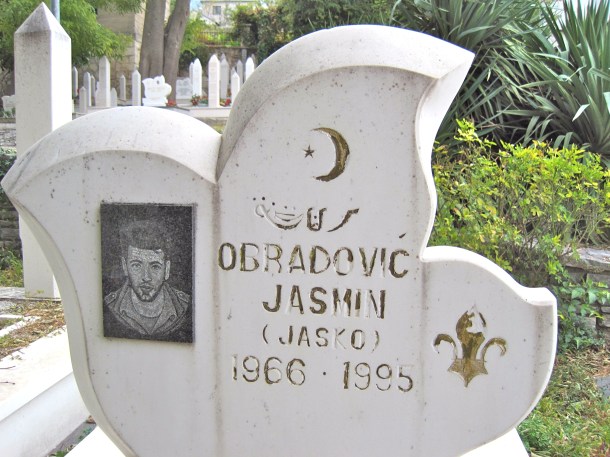
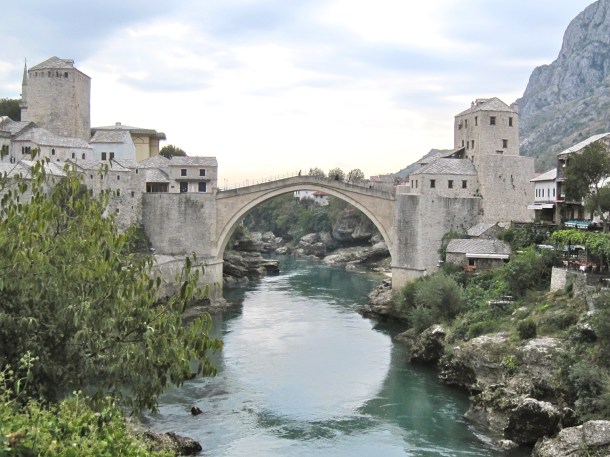
Nice post guys, and seems like a perfect analogy. Often the most interesting and beautiful places are those torn by conflict and war…thinking Jerusalem, Cairo, Dressen…sadly, it’s an ever growing list.
As you say, peace and tolerance.
Thanks Steven. It’s always sad to see violence and war erupt in a peaceful place, and it always easier to view it on TV from the other side of the world. But visits to places like Mostar help make the real consequences of war immediately obvious. ~James
Reblogged this on eugenejferguson.
Thanks so much for the reblog Eugene. ~James
I am glad you share both the good and the bad. You have struck a nice balance, sharing the beauty without glossing over the scars of war. – Mike
Thanks Mike. The government has really focused on the tourist area along the river, but it appears that virtually nothing has been done on the non-tourist areas. The line of demarcation, and the contrast is amazing. ~James
Really enjoyed reading your post. Looking forward to more from your blog. Cheers!
Thanks Jean, for the comment and for dropping by the blog. Mostar was an interesting stop in Bosnia, and was a real eye-opener for us. ~James
Right, tourist central is a very narrow area. Unfortunately, the divide between the two sides is also evident.
You’re right Kathy. The contrast was amazing. There was a large, modern office building that covered most of a block, that was particularly devastated. It was probably a government building, which made it a target. I’ve really never seen anything like it. ~James
Beautiful post, James and Terri. While in Croatia, I rented an apartment from a Bosnian family from Mostar. They left at the beginning of the conflict and have only returned to see family. They said they will never move back; it’s too painful.
The Balkan countries are intriguing to me, and I may have to plan another trip there. Posts like yours make me think sooner rather than later….
Ruth, we had never seen anything like Mostar. It was incredibly sad, but at the same time, it was good to see that life was moving on, and most people we encountered seemed to be happy. I’m sure that for many folks, there’s still an incredible amount of pain, and passing bombed-out buildings on a daily basis can’t help. Americans are incredibly insulated from this sort of thing, and places like Mostar are a good reminder. ~James
Those bridges are stunning! Nice architectural photos.
Thanks Stephanie. I’ve always been a big fan of architecture, and traveling provides lots of opportunities to not only see new types, but to compare and contrast styles. ~James
Thanks for sharing, it’s really inspiring…
Thanks Jenny. Seeing a place like Mostar recover is inspiring. I’m not sure that I’d have the strength, but things are slowly improving there. ~James
I love this photo!
Thanks much Shelley. ~James
Glad to hear things are improving, albeit slowly.
Suzanne, we also saw things improving in Sarajevo as well. The physical damage there was more widespread, but the people seem to be moving on with their lives. ~James
I thought Sarajevo was in much better shape than Mostar. partly it was conscience money that poured in after the war for rebuilding, but also the fact that there was no fighting between the inhabitants. What really destroyed Mostar was that after the Croats and the Bosniaks collaborated to defeat the invading Serbs, the Croats turned on the Bosniaks (that was when the bridge was destroyed).
You’re right about Sarajevo. Most of the damage we saw there was bullet scars, and not nearly as much wholesale destruction. Thanks for the additional details on Mostar. I read (and reread) the history of the conflict, and honestly, it was so complex that I needed a scorecard. Normal citizens on all sides must have been scared out of their wits. ~James
War just rolls through a place, wrecks it, and moves on, doesn’t it? There’s always somewhere new suffering in the headlines and the places and lives that have been devastated are forgotten. Thanks for reminding us.
Thanks Jo. With the 24/7/365 news cycle, it’s easy to get complacent about conflicts on the other side of the globe. Places like Mostar are a grim and tangible reminder that thher are real people behind the photos and videos. It was a stark reminder for both of us. ~James
I love that you show all sides of travel. I’m not sure I would have chosen Bosnia as a place to visit, but after reading your post, I could be convinced. Great post!
Thanks LuAnn. Our trip to Bosnia was a result of keeping travel plans flexible. We were in Croatia, and literally, it was me saying to Terri, “Hey, we’re only 75 miles from the Bosnian border – let’s go!” It wasn’t the easiest place to visit, but like many places we’ve seen, we’ll always be glad we went. ~James
I love the fact that your world travels have taken you to many “out of the way” places.
I have wondered why shelled buildings aren’t repaired. Now I know. Thank you for pictures and this post.
This is one of those things that I’ve never really thought much about (and luckily, never experienced), but it must be a common occurrence after wars. I’m sure there were lots of buildings in limbo in Germany after WWI and WWII ~James
I can remember seeing bomb sites in London well into the 50s.
*nods*
And in the more recent wars, I’m sure.
This is a great blogg
Thanks. Glad you enjoyed it, and Happy Holidays. ~James